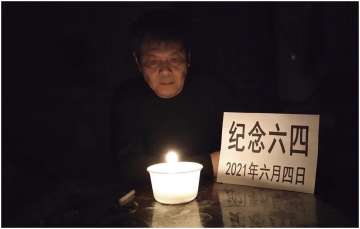A Chinese dissident, identified as Chen Siming, has appealed for asylum in the United States or Canada amid fears of deportation to Beijing after escaping to Taiwan. Chen has been living in a Taiwanese airport for several days now.
According to a report by the CNN, Chen is known for commemorating the anniversary of the 1989 Tiananmen Square massacre, which remains heavily censored in China and any observations are widely suppressed. Chen fled China in July following increased pressure and scrutiny from authorities.
Chen arrived in Taipei on Friday last week, announcing his arrival on social media platform X. “I hope to receive political asylum from the US or Canada. I ask friends to call on the Taiwanese government to not send me back to China,” he said in a video, alleging that he was forced to be "illegally stranded" there.
"The Chinese police’s stability maintanece methods directed towards me were becoming more and more cruel and crazy. They detained me at will without following legal procedures, taking my cellphone and even giving me a psychiatric evaluation. I can no longer continue to accept the ravaging of my personal dignity, the trampling of my honor and the threat to my body," he said in a post.
Chen told AP that he escaped China on July 22. For his commemorations, the Chinese dissident was penalised and placed in administrative detention. He said that China's grip on curbing dissent has tightened significantly over the past few years under the presidency of Xi Jinping.
Chen's persecution and perilious escape
Chen said that he faced repeated calls from police, who would come to his home in case he didn't pick up. After receiving a call on July 21 when the police asked him to undergo a psychiatric evaluation, Chen said that he felt "sad, angry and afraid". He packed his clothes and fled.
He reached Taiwan by travelling across China to the southern border with Laos, a risky route for people trying to flee the country. By early August, Chen crossed the Mekong River and entered Thailand.
He registered as a refugee with the United Nations High Commissioner for Refugees, but felt unsafe due to fears over detainment by Thai police or immigration authorities. Thailand does not recognise the concept of asylum for refugees and outsources claims to the UN. Thailand also shares friendly relations with China, and many dissidents there have ended up in Chinese custody.
Dissidents escaping from China
China has witnessed an increasing trend of dissidents, especially pro-democracy protesters, escaping the country in wake of large-scale crackdown by authorities. Taiwan has emerged as a safe haven for dissidents fleeing China.
However, Taiwan also does not recognise the concept of asylum and the UN refugee agency does not operate there. Hence, Chen was taken for questioning by Taiwan’s immigration authorities and the Mainland Affairs Council
Prior to this, two Chinese dissidents spent months living at Taoyuan before their cases were eventually resettled in Canada.
“With regard to the matter of Chinese dissident Chen Siming being stranded at the Taoyuan International Airport, the government is currently working on it, and is not able to share relevant details," said Taiwan's Mainland Affairs Council.
In August this year, prominent Chinese lawyer Lu Siwei was arrested in Laos while traveling to the United States, facing threat of deportation back to China. The news of his arrest also prompted dozens of human rights groups to sign a petition calling on Laos authorities to release Lu and to halt deportation processes,
(with agency input)
ALSO READ | Philippines removes 'hazardous' floating barrier installed by China in disputed South China Sea
Latest World News
